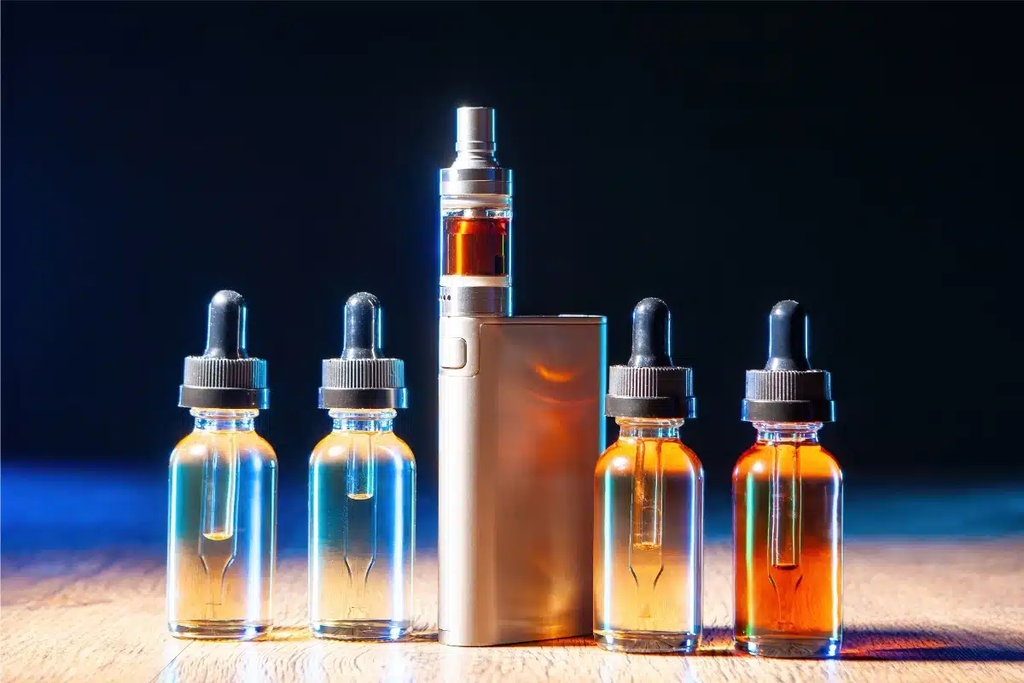
In recent years, vaping has gained popularity as an alternative to traditional tobacco smoking. However, safety concerns have led to strict regulations on e-liquid ingredients within the UK to protect consumers from harmful substances.
This article explores the banned vape ingredients in the UK and the reasons for these prohibitions.
What are E-Liquids?
E-liquids, also known as vape juice, are liquids in small bottles that can be vaporised to create vapour for e-cigarettes. They were brought into circulation as an alternative method to encourage traditional tobacco smokers to quit smoking. E-liquids come in various nicotine strengths and flavours to accommodate users’ preferences.
Although there is no long-term evidence regarding health risks, e-liquids are considered a healthier alternative to tobacco products.
What Are the Main E-Liquid Ingredients that are Safe to Use?
They typically consist of a base mixture of:
Propylene glycol (PG)
This colourless, odourless liquid provides a strong throat hit. Usually found in food and pharmaceutical products, it effectively carries the flavour within the vaping experience.
Vegetable Glycerine (VG)
This ingredient is derived from plant oils and is much thicker than propylene. It’s also sweeter, which gives the e-liquid a slightly sweet taste. Overall, VG produces dense vapour clouds.
Nicotine
Nicotine is a highly addictive ingredient, also present in tobacco cigarettes, and therefore mimics the effects of traditional tobacco smoking, helping many to quit smoking tobacco products permanently. It comes in various strengths, allowing users to break their nicotine dependency gradually. Consequently, its inclusion in e-liquids is optional.
Flavourings
Several food-grade additives provide e-liquids with their distinct flavours. Many users are attracted to the fruity and sweet options, while tobacco and menthol flavours are also available to replicate the experience of traditional smoking.

What Ingredients are Banned in E-liquids in the UK?
Here’s a list of some of the vape ingredients which are banned in e-liquids in the UK based on UK government guidance:
Respiratory sensitisers
These can make the respiratory system sensitive, leading to severe allergic reactions, asthma and other respiratory issues upon exposure.
Vitamin E acetate
When inhaled, Vitamin E acetate can interfere with normal lung function. Its thick and oily consistency can cause severe lung inflammation and damage.
Stimulant additives such as caffeine or taurine
When inhaled, these stimulants can affect the cardiovascular system, potentially leading to increased heart rate, high blood pressure and other cardiovascular problems.
Diacetyl
Diacetyl, which gives products a buttery flavour, is known to cause bronchiolitis obliterans, commonly known as ‘popcorn lung’. This severe and irreversible lung disease is characterised by scarring and narrowing of the small airways in the lungs. Many who worked in a popcorn factory were affected by this substance.
Pentane 2,3 dione
Similar to diacetyl, this substance has been linked with respiratory toxicity and the development of bronchiolitis obliterans.
Diethylene glycol
This chemical is toxic when inhaled, ingested or absorbed through the skin. It’s known to cause kidney damage, respiratory failure and other severe health issues.
Ethylene glycol
Known for its toxicity, ethylene glycol can cause central nervous system depression, respiratory distress and acute kidney injury if inhaled.
Formaldehyde
A known carcinogen, formaldehyde, can irritate the respiratory system, eyes and skin. Prolonged exposure can lead to cancer.
Acetaldehyde
A potential carcinogen, it can irritate the eyes, skin and respiratory tract. Prolonged exposure can increase the risk of developing cancer.
Acrolein
Highly irritant to the respiratory tract, acrolein can cause severe lung damage and is linked to an increased risk of lung cancer.
Metals
Inhalation of metals, including cadmium, chromium, iron, lead, mercury and nickel, is hazardous and can cause the metals to accumulate in the body, causing various health issues such as respiratory and neurological damage, as well as cause cancer.
What is the Legal Limit on Bottle Sizes in the UK?
In the UK, the legal limit on e-liquid refill bottle sizes containing nicotine is 10 millilitres or less. This regulation is part of the Tobacco and Related Products Regulations 2016, which aligns with the European Union’s Tobacco Products Directive (TPD).
This restriction is primarily intended to minimise the risk of nicotine poisoning, particularly for adolescent youths and non-smokers who are attracted to fruity sweet vapes. By enforcing these limits, the UK government can seek a balance between the availability of e-liquids for smokers looking to quit traditional cigarettes and public health.
Who Regulates Vapes in the UK?
In conjunction with other regulatory bodies, the Medicines and Healthcare Products Regulatory Agency (MHRA) regulates vape ingredients in the UK. The MHRA ensures that all vaping products comply with the Tobacco and Related Products Regulations 2016, which incorporates the European Union’s Tobacco Products Directive (TPD) requirements. This includes oversight of product safety, quality standards, labelling and advertising to ensure that vaping products do not pose undue risks to users.
Which E-Liquids are Best to Purchase?
When choosing e-liquids, premium e-liquids from established UK manufacturers are often the best choice, as these companies will prioritise safety, flavour consistency and overall product excellence.
